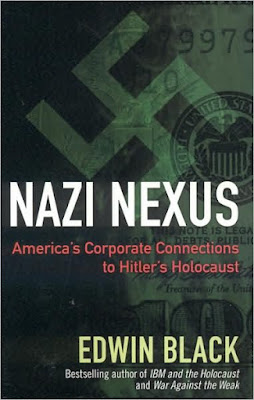BY RICHARD PACHTER
Nazi Nexus: America's Corporate Connections to Hitler's Holocaust. Edwin Black.
Author Edwin Black is a child of Holocaust survivors. When he first saw an IBM card-sorting machine as part of an exhibit at the United States Holocaust Museum, he vowed to learn more about this machine and the role of its manufacturer. The result was 2001's IBM and the Holocaust., a devastating account of the venerated American firm's hand-in-hand collaboration with Adolf Hitler's Nazi government in identifying, organizing and exterminating Jews and others who were deemed non-Aryan and undesirable. Black's exhaustive investigation, abetted by an international research team, resulted in worldwide headlines — and stonewalling, obfuscation and denials by its subject — which continues to this day.
Black's next book, War Against the Weak (2003), studied the role of the fake science of eugenics and its rise in the United States in the early 20th century, which provided the rationale for Hitler's racial policies. In shocking detail, Black related the subjugation, sterilization and murder of thousands of Americans solely on the basis of their race, country of origin or failure to pass culturally biased ''intelligence'' tests. This was fueled by xenophobia and ignorance, and supported -- astonishingly -- by corporate names like Carnegie, Rockefeller and others.
NEW WORK
Black's new Nazi Nexus uses these earlier works as primary sources. But this new volume offers a compact and highly concentrated dose of history that powerfully demonstrates the deleterious effects of the convergence of avarice and ideology, American-style.
The author's premise is that American businesses beyond IBM were also complicit with Hitler's rise to power, conquest of Europe and war against the United States and that many of their activities continued through the war. In addition to doing business with the Nazis, philanthropic organizations like the Rockefeller Foundation, for example, contributed the equivalent of millions of dollars in support of German institutions devoted to eugenics, which served to legitimatize racism by attaching a ''scientific'' basis for it, according to Black. The ties between German and American researchers in this area are astounding.
Black subsequently cast his attention to our insatiable consumption of petroleum in Internal Combustion, which also covered the role of General Motors in supplying Hitler with a fleet of vehicles that enabled the Nazi blitzkrieg across Poland and other nations. It was made possible, Black writes, by the close cooperation between the Germans and a wholly owned GM operation, Opel, which manufactured a light truck called the Blitz, hence ''blitzkrieg,'' the lightning attack. Black writes about GM CEO Alfred P. Sloan, who not only collaborated with the Nazis, but also worked hard to organize opposition to President Franklin Roosevelt's administration whenever possible.
NOT JUST COMPILATION
More than just a ''greatest hits'' offering, Nazi Nexus brings several seemingly disparate threads together to create a fuller portrait of this dreadful chapter of our history. Though one may wish to see more details of other notorious American Nazi enablers (Google ''Bush'' and ''Nazi'' to read news reports of the former president's grandfather's collaboration, for example), Edwin Black has done more than his share. If you missed his earlier books, this is a great place to begin, and if you read one or two but not the rest, Nazi Nexus ties them all together succinctly and frighteningly.
Monday, March 16, 2009
Nazi Nexus Review
Subscribe to:
Post Comments (Atom)





No comments:
Post a Comment